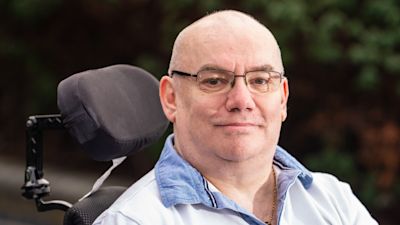Ex-serviceman 'tortured' by RAF for being gay fights for justice

A former serviceman who faced "torture" by the RAF when it was revealed he was gay has vowed to fight for justice for others who suffered the same treatment.
Simon Hinchley-Robson was working at RAF Brawdy in Pembrokeshire when his superiors found out he was gay.
The armed forces cook was subjected to four days of interrogation, including strip searches in what was described as "torture" by his MP Clive Efford, in a House of Commons testimony.
The 57-year-old who now lives in south-east London, has vowed to fight for recognition that what happened to him was wrong, and said others faced the same treatment.
He also believes that despite UK Government claims the armed forces are now LGBT-friendly, this is not the case.
Mr Hinchley-Robson, who was 21-years-old when he was discharged from the RAF in 1986 for being gay, said: "I wanted them to come forward and say they were wrong.
"All I wanted was my pension reinstated. That was it. I wasn't after major money or anything like that.
"There are so many people who will have gone through exactly the same. There are at least four people that I know, from Gibraltar to back in the UK, who went through a similar thing and unfortunately they hanged themselves.
"And I want justice for them as well."
He added: "Although they say you can be open in the forces, I would still dispute, if I walked into an army recruitment office or the marines and said 'by the way I am gay, I want to join up', they would find everything they could to stop me from joining up. They really would."
Mr Hinchley-Robson signed up to serve his country in 1980, but in 1986, while serving as a chef at the RAF base in Pembrokeshire, he became ill and was diagnosed as having glandular fever.
He continued to lose weight after the diagnosis by RAF medical staff and he requested a test for Aids.
Mr Hinchley-Robson was transferred to a civilian hospital where he took the test and was discharged after 10 days.
The request for the test was taken as an admission that he was gay, and on his return Mr Hinchley-Robson was arrested by RAF police, the special investigation branch.
In a testimony read in the Commons by Eltham MP Mr Efford, the ex-serviceman wrote that what happened to him next was "the most horrendous and awful experience no-one should ever have to endure".
He said: "I was led to an interrogation room, this - unknown to me - was going to be my home for the next four days.
"I was denied food, I was denied sleep and only given small amounts of water.
"I was immediately searched, asked to strip and searched internally. They said this was the procedure."
MPs heard he refused a request to name any person in any of the services that he had some sort of relationship with, leading to him being assaulted.
He added: "The medical gloves went on and I was again subject to what I can only say was rape while I was again internally searched."
A new search followed a change of shift every four hours, with Mr Efford describing what happened to his constituent as "a form of torture for being gay".
After the Labour MP raised the treatment of his constituent in Parliament, the UK Government invited Mr Hinchley-Robson to apply to have his armed forces pension reinstated and insisted the military was a more welcoming place to LGBT people today than in the 80s.
Mr Efford said he was "struck by the response from the Government".
He said: "They were listening, there was more of a tone of understanding and contrition than we had been getting from our correspondence.
"There must be many other people who have been treated in a similar way, and I would urge them to come forward if they have seen the debate.
"If they are saying 'I'm in that situation myself' then please come forward and we will try to work together to get some justice."
Ministry of Defence statement
A Ministry of Defence spokesperson said: "We are proud of LGBT+ service personnel and value their current and historic contributions to our Armed Forces.
"It will always remain deeply regrettable that personnel were historically discriminated against because of their sexuality, it was unacceptable then and it is unacceptable now. We do not tolerate any form of bullying, harassment and discrimination within defence.
"We take the wellbeing of all those who have served extremely seriously and have a range of support mechanisms in place for our veterans."
It is understood that the UK Government is currently working to understand the impact of how LGBT people were treated in the armed forces before the year 2000.